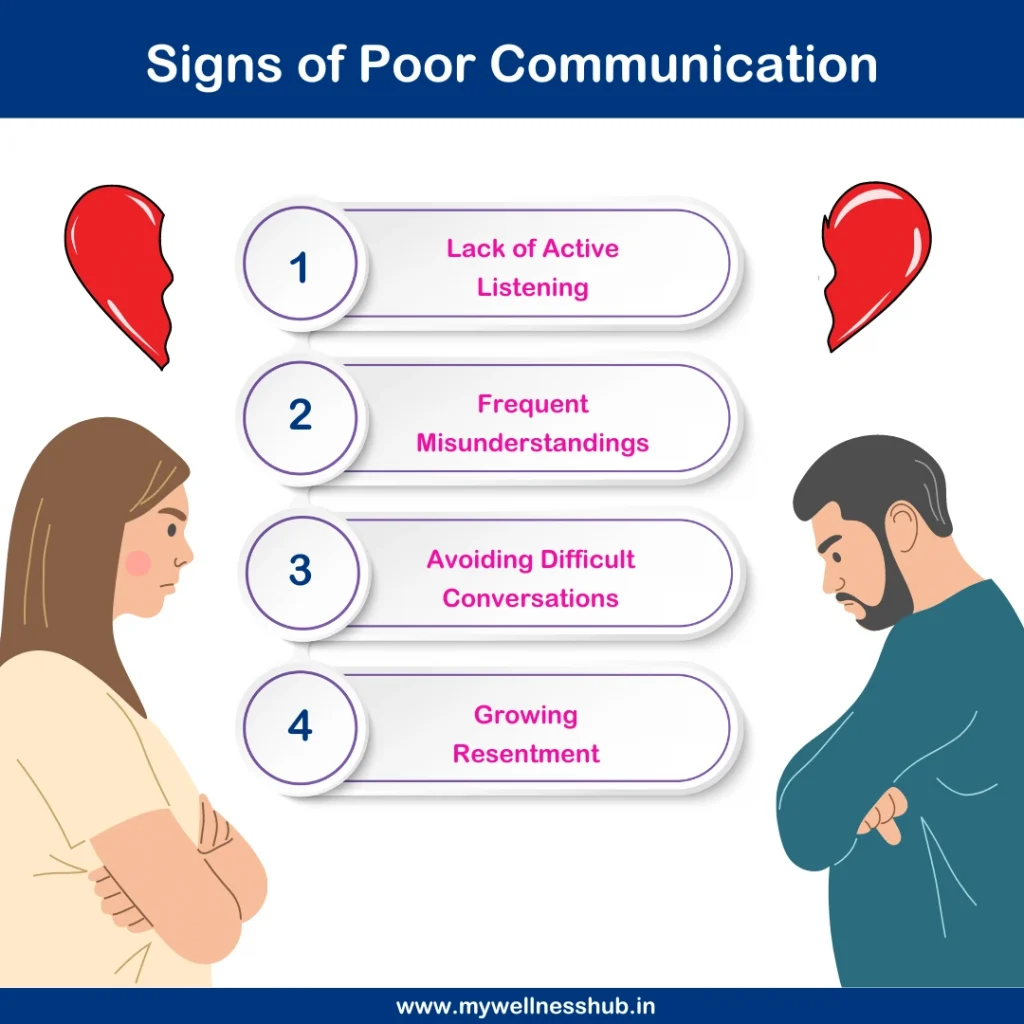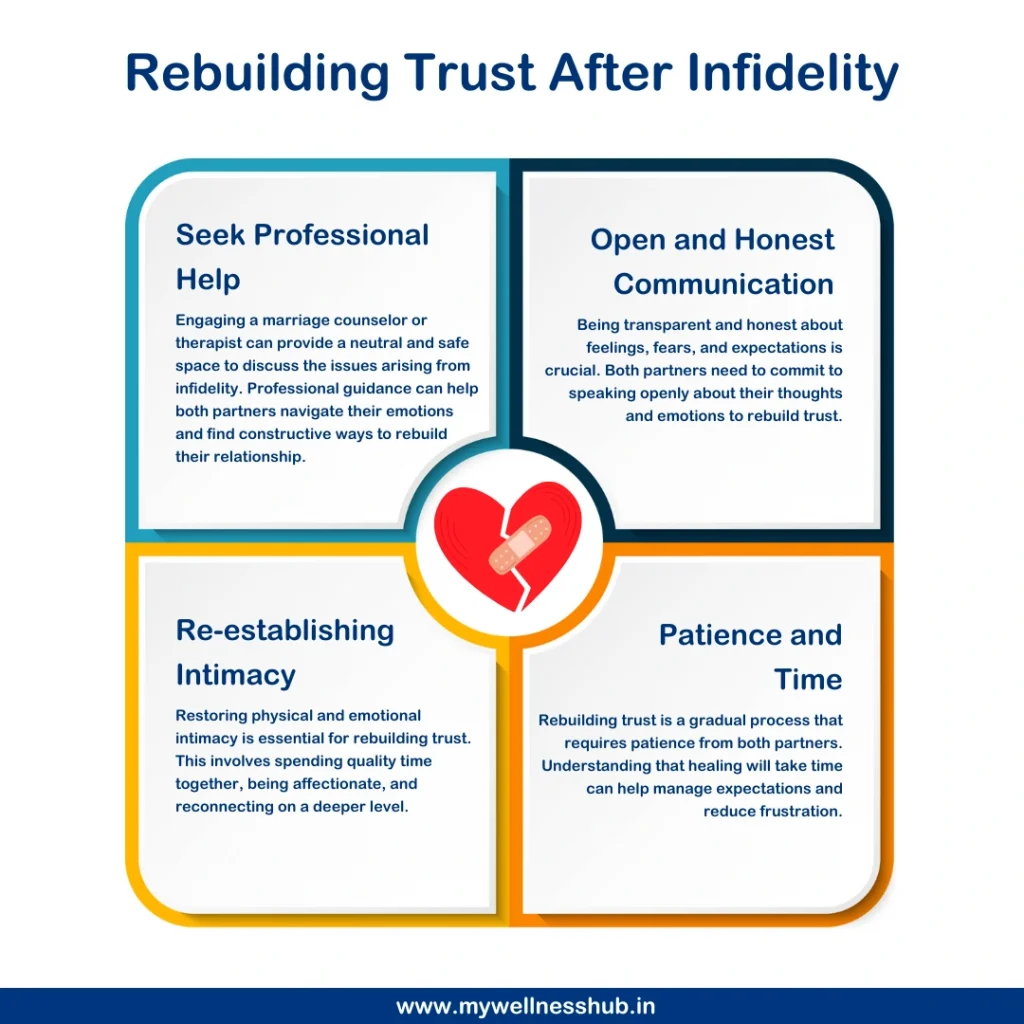10 Frequent Marriage Problems and How to Deal With Them
By Prapoorna M
Last Updated: August 5, 2024
Marriage is a journey of love, companionship, and shared dreams, beautifully weaving together the highs and lows of life. Yet, no marriage is devoid of challenges. Whether it’s communication mishaps, financial strains, or conflicting ambitions, these hurdles are part and parcel of any enduring relationship. It’s crucial to recognize that these issues don’t spell the end; rather, they present opportunities for growth. Confronting difficulties together not only deepens understanding but also enhances communication and fortifies the bond. Embrace these moments as chances to strengthen your partnership, building a resilient and enriched union.
1. Lack of Communication

Description: Poor communication is one of the most common marriage problems and can lead to misunderstandings and resentment. When couples fail to communicate effectively, small issues can escalate into significant conflicts, creating a gap that becomes harder to bridge over time.
Solution: To improve communication in your marriage, practice active listening and maintain open dialogue. Active listening means truly hearing your partner’s words without interrupting or planning your response while they are still speaking. Use “I” statements to express your feelings, such as “I feel upset when…” instead of “You always…”. This approach reduces blame and focuses on how specific actions affect you personally, fostering a more constructive conversation.
Tip: Schedule regular check-ins to discuss feelings and concerns. These dedicated times for communication can prevent misunderstandings and ensure that both partners feel heard and valued. It can be as simple as a weekly coffee date or a walk in the park where you both talk openly about your thoughts and feelings. Regular communication helps keep the connection strong and prevents issues from festering.
2. Lack of Intimacy
Description: Emotional and physical intimacy often declines over time in many marriages. Life’s daily demands, stress, and the routine nature of long-term relationships can cause partners to drift apart, leading to feelings of loneliness and disconnection. This lack of intimacy can weaken the bond between partners, making it harder to navigate other marital challenges.
Solution: To rekindle intimacy, prioritize intimate moments and openly discuss your desires and concerns with your partner. It’s crucial to make intimacy a regular part of your relationship, not just something that happens sporadically. Share your feelings and listen to your partner’s needs without judgment. This openness can help rebuild trust and closeness.
Tip: Plan regular date nights to spend quality time together, away from daily distractions. Whether it’s a romantic dinner, a movie night, or a simple walk in the park, these moments can help you reconnect and strengthen your bond. Additionally, be honest about your needs and desires, and encourage your partner to do the same. This honest communication can enhance both emotional and physical intimacy, bringing you closer together.
3. Money Problems
Description: Financial stress is a common source of conflict in many marriages. Disagreements over spending habits, savings goals, and financial priorities can lead to significant tension. When couples are not on the same page about money, it can cause frustration, resentment, and ongoing arguments that undermine the relationship.
Solution: To mitigate financial stress, it’s essential to have regular financial discussions and set a budget together. Transparency is key. Discuss your financial goals, expectations, and concerns openly with your partner. By creating a budget that reflects both of your priorities, you can work together towards shared financial stability and avoid misunderstandings.
Tip: Try a monthly “money date” to manage finances and plan fun activities. This dedicated time allows you to review your financial status, pay bills, and adjust your budget as needed. It also provides an opportunity to plan enjoyable activities together, reinforcing the idea that managing finances is a joint effort that benefits both partners. Making these discussions a regular part of your routine can reduce financial stress and improve your overall relationship.
4. Different Life Stages
Description: Couples may grow apart due to differing life goals or stages.
As life progresses, it’s common for couples to find themselves in different stages. One partner might be focused on advancing their career, while the other is ready to settle down and start a family. These differences can lead to feelings of disconnection and frustration. It’s crucial to acknowledge that growing apart doesn’t mean the end of the relationship. Instead, it’s an opportunity to realign your paths and strengthen your bond.
Solution: Engage in activities that reconnect you, like shared hobbies or regular outings.
Finding ways to reconnect is essential. Think about the activities you both enjoyed when you first met. Was it hiking, cooking together, or watching movies? Reintroducing these activities can reignite that initial spark. Additionally, exploring new hobbies together can be exciting and create fresh memories. Plan regular outings, whether it’s a simple walk in the park or a weekend getaway. These moments of connection can bridge the gap created by different life stages.
Tip: Communicate about your goals and find common ground.
Open communication is key. Sit down with your partner and discuss your individual goals. Understanding each other’s aspirations can help you find common ground. Maybe you both want to travel more, or perhaps one of you wants to go back to school while the other supports this journey. Compromise and mutual support are vital. Regularly revisit these conversations to ensure you’re both on the same page as life evolves.
5. Infidelity

Description: Infidelity, whether physical or emotional, can shatter the trust that is the foundation of any marriage. When one partner cheats, it creates a deep emotional wound that can be incredibly difficult to heal. Trust is broken, and the betrayed partner often feels a mix of anger, sadness, and betrayal.
Solution: Rebuilding trust after infidelity is challenging, but it is possible with commitment and effort from both partners. Seeking professional help is crucial. A marriage counselor can provide a safe space for both partners to express their feelings, understand the underlying issues that led to the infidelity, and develop strategies to move forward. It’s important to be patient and willing to work through the pain and distrust, as healing takes time.
Tip: Address emotional distance early to prevent infidelity. Often, infidelity arises from feelings of emotional neglect or unmet needs within the marriage. Regularly check in with your partner about their emotional and physical needs. Open communication and emotional connection can help maintain intimacy and prevent feelings of isolation that may lead to infidelity.
6. Jealousy
Description: Excessive jealousy can be a destructive force in a marriage, leading to control, conflict, and a breakdown in trust. When jealousy becomes pervasive, it can cause one partner to feel constantly scrutinized and mistrusted, which can strain the relationship and create a hostile environment.
Solution: Addressing jealousy often requires understanding and dealing with underlying insecurities. Seeking therapy can be an effective way to explore these issues. A therapist can help both partners understand the root causes of jealousy, develop healthier coping mechanisms, and build trust in the relationship.
Tip: Be transparent about your feelings and reassure each other regularly. Open communication is crucial in combating jealousy. Share your insecurities with your partner and listen to their concerns without judgment. Regular reassurance and affirmations of love and commitment can help alleviate fears and build a stronger, more trusting bond.
7. Boredom
Description: Routine can sometimes make a relationship feel stagnant. When couples fall into repetitive patterns, it can lead to feelings of boredom and a sense of disconnection. This monotony can dampen the excitement and spark that once fueled the relationship.
Solution: To keep your relationship exciting and vibrant, introduce new activities and experiences. Breaking out of your routine can reignite the passion and create new, shared memories. This could be anything from trying a new hobby together, traveling to new places, or simply changing your daily routine.
Tip: Take up new hobbies together or surprise each other with thoughtful gestures. Exploring new interests as a couple not only adds excitement but also strengthens your bond. Small surprises, like leaving a sweet note or planning an unexpected outing, can go a long way in keeping the relationship fresh and enjoyable.
8. Disrespecting Boundaries
Description: Overstepping personal boundaries can erode trust and respect in a relationship. When one partner continually disregards the other’s personal space and limits, it can lead to feelings of resentment and mistrust. This lack of respect for boundaries can damage the foundation of a healthy marriage.
Solution: To maintain a strong and respectful relationship, it’s crucial to clearly communicate and respect each other’s personal space and limits. Discuss what boundaries are important to each of you and ensure that both partners understand and agree to respect them. This mutual understanding helps to create a safe and supportive environment where both individuals feel valued and respected.
Tip: Regularly discuss and adjust boundaries as needed. Relationships evolve, and so do personal needs and boundaries. Make it a habit to check in with each other periodically to ensure that your boundaries are still being respected and adjust them if necessary. This ongoing communication helps to prevent misunderstandings and ensures that both partners continue to feel respected and understood.
9. Stress
Description: Daily stress is a common part of life, but it can easily spill over into your relationship if not managed properly. Work pressures, family responsibilities, and personal challenges can all contribute to a stressful environment, leading to irritability, impatience, and conflict between partners.
Solution: To prevent stress from negatively affecting your relationship, it’s important to develop individual stress-management techniques and support each other. Find methods that work for you, such as exercise, meditation, or hobbies, and make these a regular part of your routine. Encourage your partner to do the same and offer support in their stress-relief activities.
Tip: Engage in activities that help you both relax and unwind together. This could be anything from taking a walk, practicing yoga, or enjoying a quiet evening at home with a good movie. Shared relaxation activities not only reduce stress but also strengthen your bond and improve your overall relationship.
Also read: Feeling stressed in your relationships? Tips to handle
10. Differing Values
Description: Conflicts often arise in marriages when partners have differing core values. These differences can be about religion, politics, child-rearing practices, or even fundamental beliefs about life. Such conflicts can create tension and lead to misunderstandings, making it difficult for couples to find common ground.
Solution: To address these conflicts, it’s essential to have open discussions where both partners can express their perspectives honestly and without judgment. Understanding each other’s viewpoints can pave the way for finding compromises that respect both partners’ values. It’s important to approach these conversations with empathy and a willingness to see things from your partner’s perspective.
Tip: Consider therapy to navigate significant value differences. A therapist can provide a neutral space to discuss these issues and help you find common ground. Professional guidance can be invaluable in resolving deep-seated conflicts and ensuring that both partners feel heard and respected.
Causes and Solutions for Common Marriage Problems
| Problem | Cause | Solution |
|---|---|---|
| Lack of Communication | Poor listening, avoiding conversations | Practice active listening, schedule regular check-ins, use “I” statements to express feelings without blame |
| Lack of Intimacy | Emotional distance, routine | Prioritize intimate moments, openly discuss desires and concerns, plan regular date nights |
| Money Problems | Financial stress, different spending habits | Have regular financial discussions, set a budget together, try a monthly “money date” to manage finances and plan activities |
| Infidelity | Emotional or physical cheating | Seek professional help, work on rebuilding trust, address emotional distance early |
| Jealousy | Insecurities, lack of trust | Seek therapy to address underlying insecurities, be transparent about feelings, provide regular reassurance |
| Boredom | Routine, lack of excitement | Introduce new activities and experiences, take up new hobbies together, surprise each other with thoughtful gestures |
| Disrespecting Boundaries | Overstepping personal limits | Clearly communicate personal space and limits, respect each other’s boundaries, regularly discuss and adjust boundaries as needed |
| Stress | Daily pressures spilling over | Develop individual stress-management techniques, support each other, engage in activities that help both relax and unwind together |
| Differing Values | Conflicts in core beliefs | Have open discussions to understand each other’s perspectives, find compromises, consider therapy to navigate significant value differences |
Conclusion
Addressing common marriage problems is essential for keeping your relationship healthy and happy. By recognizing and dealing with issues like lack of communication, money stress, and differing values, you and your partner can strengthen your bond. Remember, every relationship faces challenges, and it’s okay to seek help when needed. Talking openly, prioritizing intimacy, managing stress, and respecting each other’s boundaries are all key steps towards a better marriage.
Don’t hesitate to get professional guidance if you’re having trouble with these issues. A counselor or therapist can offer valuable support and advice. For more help and advice, check out the resources at Wellness Hub. Our articles and expert insights can provide practical solutions to many common relationship problems. Visit Wellness Hub for more information on how to strengthen your relationship and build a lasting, loving partnership. Remember, working together is the key to a successful marriage, and every challenge is an opportunity to grow closer.
Frequently Asked Questions:
1. What are the most common problems in marriage?
Common marriage problems include lack of communication, financial stress, lack of intimacy, differing life stages, infidelity, jealousy, boredom, disrespecting boundaries, daily stress, and differing values. Addressing these issues early can help maintain a healthy relationship.
2. How can we improve communication in our marriage?
Improving communication involves practicing active listening, using “I” statements to express feelings without blame, and scheduling regular check-ins to discuss feelings and concerns. Open and honest dialogue is key to understanding each other better.
3. What should we do if we are experiencing financial stress in our marriage?
To manage financial stress, have regular discussions about your finances and set a budget together. Consider trying a monthly “money date” to review finances and plan enjoyable activities. Transparency and teamwork in managing money can reduce conflict.
4. How can we maintain intimacy in our marriage?
Maintaining intimacy requires prioritizing intimate moments and openly discussing desires and concerns. Plan regular date nights and be honest about your needs. Keeping the connection strong is essential for a healthy relationship.
5. How do we rebuild trust after infidelity?
Rebuilding trust after infidelity involves seeking professional help, being patient, and working together to understand the underlying issues. Addressing emotional distance early and maintaining open communication are crucial steps in the healing process.
6. How can we handle jealousy in our marriage?
Handling jealousy involves seeking therapy to address underlying insecurities and being transparent about your feelings. Regular reassurance and open communication can help alleviate fears and build a stronger bond.
7. What can we do to prevent boredom in our relationship?
To prevent boredom, introduce new activities and experiences to keep things exciting. Take up new hobbies together or surprise each other with thoughtful gestures. Maintaining novelty in the relationship can keep it fresh and enjoyable.
8. How can we respect each other’s boundaries in marriage?
Respecting each other’s boundaries involves clear communication and mutual respect for personal space and limits. Regularly discuss and adjust boundaries as needed to ensure both partners feel valued and understood.
9. How do we manage daily stress without it affecting our relationship?
Managing daily stress requires developing individual stress-management techniques and supporting each other. Engage in activities that help you both relax and unwind together, creating a more harmonious and supportive environment.
10. How can we navigate differing values in our marriage?
Navigating differing values involves having open discussions to understand each other’s perspectives and finding compromises. Consider therapy to help navigate significant value differences and ensure both partners feel heard and respected.
About the Author:
Prapoorna Mangalampalli
M.Sc., M.A., (Dual Masters in Psychology & English) – Counselor (6+ years of experience)
Prapoorna, with dual Master’s degrees in Psychology and English and over 6 years of experience, elevates human experiences through insightful counseling. She excels in online, marital, relationship, child, family, and career counseling. At Wellness Hub, she thrives in a team environment, valuing innovation, compassion, and client success.
Book your Free Consultation Today
Parent/Caregiver Info:
Client’s Details:
* Error Message









